中国领事的志愿者
在过去的至少十年里,中华人民共和国的大使馆和领事馆一直在世界各国开展领事志愿者活动。对大多数东道国而言,这些活动似乎都并未申报。
点此阅读完整内容(仅提供英文全文)。
最近一项中华人民共和国国务院法令于2023年9月1日生效,正式确立了这些领事志愿者网络的建立,仅仅几个月前,G7广岛领导人公报明确要求中华人民共和国遵守《维也纳领事关系公约》。
在G7广岛领导人公报明确要求中华人民共和国遵守《维也纳领事关系公约》的数个月后,中华人民共和国国务院颁布于2023年9月1日正式生效的最新法令,正式确立了这些领事志愿者网络的建立。
此网络透过统战部联系的组织和不同个体运作,并展示了国务院侨务办公室(OCAO)的参与。根据2022年1月的一项加拿大联邦法院的裁决,该法院揭露并确认中国侨办属于从事间谍活动并损害加拿大利益的组织,同时对“中国侨办与海外华人社区的互动、所收集的情报以及可预期的情报收集活动”表示担忧。
将海外统战网络与提供领事社区援助等服务的机构合并不但使他们有能力获取不同对象的个人资料、家庭地址和联系信息等,并可能更有系统地危害或操纵海外团体以及对持不同政见者使用胁迫手段。
我们再次建议合法机构对此类做法以及可能代表或受党和国家之托参与此类活动的人士进行审查。我们进一步建议所有民主社会的官员和持份者,避免参与与统战部有关联的组织或个体所举办的活动,以免使其合法化。
点此阅读完整内容(仅提供英文全文)。
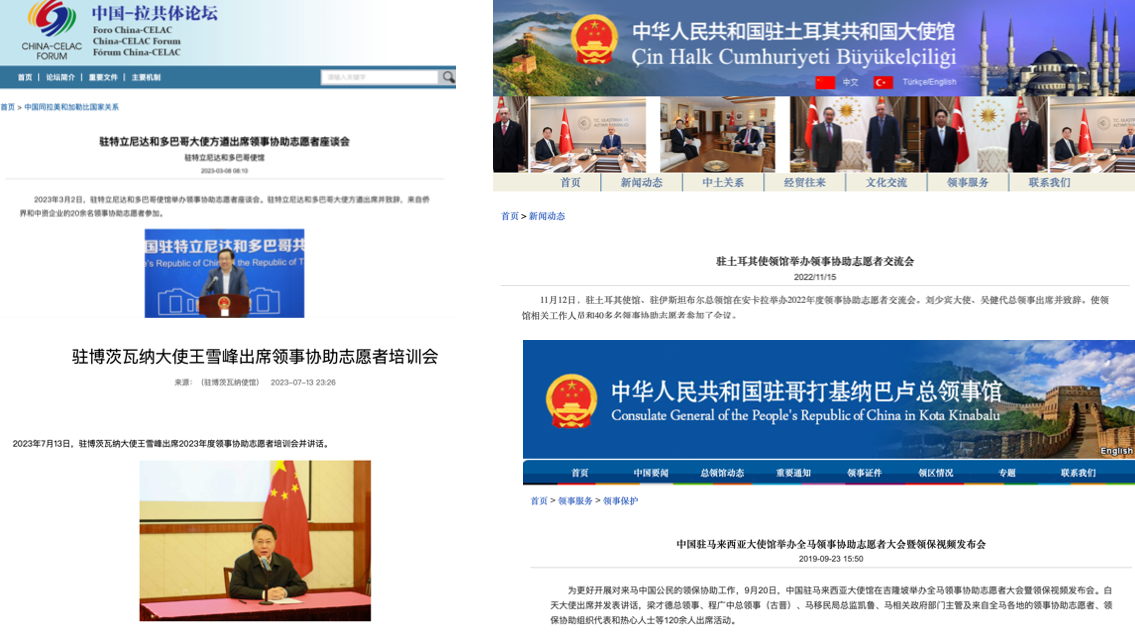
On June 29th 2023, the Regulations of the People's Republic of China on Consular Protection and Assistance [中华人民共和国领事保护与协助条例] were adopted by the State Council. They entered into force on September 1st.

The Decree was issued roughly one month after the adopted G7 Hiroshima Leaders’ Communiqué of May 20, 2023, which included a dedicated China-section. Among the positions outlined, one stood out to us: “We call on China to act in accordance with its obligations under the Vienna Convention on Diplomatic Relations and the Vienna Convention on Consular relations, and not to conduct interference activities aimed at undermining the security and safety of our communities, the integrity of our democratic institutions and our economic prosperity.”
The generic rebuke reads as a partial response to reports on the establishment of so-called “overseas police service centers” by Chinese public security authorities in close cooperation with the United Front Work Department and its sprawling transnational repression activities aimed at suppressing the fundamental freedoms of diaspora communities (and not only them) around the world.
Attentive readers of our December 2022 report Patrol and Persuade may remember the express reference made to the Vienna Convention on Consular Relations. Its opening articles (1 to 5) clearly stipulate the rules under which consular functions are to be exercised in any host country. We note in particular the provision in article 3 that “Consular functions are exercised by consular posts” (as defined in article 1) and in article 4 that “A consular post may be established in the territory of the receiving State only with that State’s consent. […] The consent of the receiving State shall also be required if a consulate-general or a consulate desires to open a vice-consulate or a consular agency in a locality other than that in which it is itself established. The prior express consent of the receiving State shall also be required for the opening of an office forming part of an existing consular post elsewhere than at the seat thereof.”
The Convention leaves little room for interpretation. Yet in typical PRC fashion the State Council resolved to “legalize” a practice they had been conducting abroad since at least 2013 - redolent of the infamous ‘rule by law’ system where grey zone or previously illegal practices are codified in China’s domestic legislation. In fact, a Ministry of Justice note on the Regulations states: “[…] some effective practices accumulated in the practice of Chinese consular protection and assistance need to be solidified at the level of the rule of law to promote the long-term development of this work” whereas “a system of consular protection and assistance with Chinese characteristics is gradually forming.”
In what otherwise seems like a rather bland decree on consular protection and assistance that repeats the need to abide by international law and the consent of the host country, concluding articles 24 and 25 add a special category: consular volunteers.

Article 24 The State encourages relevant organizations and individuals to provide voluntary services for consular protection and assistance. The state encourages and supports insurance companies, emergency rescue agencies, law firms and other social forces to participate in consular protection and assistance.
Article 25 Organizations and individuals that have made outstanding contributions to consular protection and assistance shall be commended and rewarded in accordance with the relevant provisions of the State.
These provisions – which were notably absent from the March 26, 2018, draft Regulation circulated by the Foreign Ministry for public comment - are cited as highlights in the aforementioned Ministry of Justice note on the Significance and highlights of the Regulations of the People's Republic of China on Consular Protection and Assistance, and further underlined during a joint press conference by the Ministry of Justice and Ministry of Foreign Affairs.
Innocent-looking enough, is it not? One might even argue this is further proof of what the PRC authorities have been saying all year in response to the reports on overseas police contact points, e.g. that they were solely providing assistance to overseas communities in need. We would argue otherwise, but let’s go back to the beginning.
The practice of having consular volunteers is not novel for PRC diplomatic outposts and their presence has been reported before (see for example, Xiao Xu for the Globe and Mail, Didi Kirsten Tatlow for Newsweek or Chen Yun for Voice of America). PRC authorities themselves have hardly made a secret of them as they used the services rendered in an attempt to legitimize the links uncovered between the same United Front network and public security authorities or courts and procuratorates [court mediation points] in China.
Accounts of the practice go back at least ten years [so well ahead of the difficulties created by the COVID 19 pandemic that PRC authorities often offer up as an excuse]. According to Xinhua, the Chinese Embassy in Belgium first began to establish a consular liaison volunteer mechanism in 2013. As per a release from the Foreign Ministry that cites the 2013 debut, the practice was formalized in 2017 with an inauguration ceremony of the Belgian Overseas Chinese Consular Protection Volunteer Service Group held at the embassy.

During a training and commendation meeting held by the same embassy in January 2018 and “attended by more than 70 consular protection volunteers from overseas Chinese groups, Chinese-funded enterprises, local academic federations and related overseas Chinese groups”, China News Service reports that the network is “composed of 53 volunteers from the overseas Chinese community in Belgium, Chinese-funded enterprises and international students. It has 12 volunteer services covering 10 provinces in Belgium and the capital Brussels”. The account of events published on the Foreign Ministry’s website also highlights how one of the volunteers had previously been invited back to China to participate in consular protection training back home, a returning feature in accounts across countries.
Belgium is obviously not the only country with active consular volunteers. If anything, the initiative appears a rather sprawling worldwide feature.
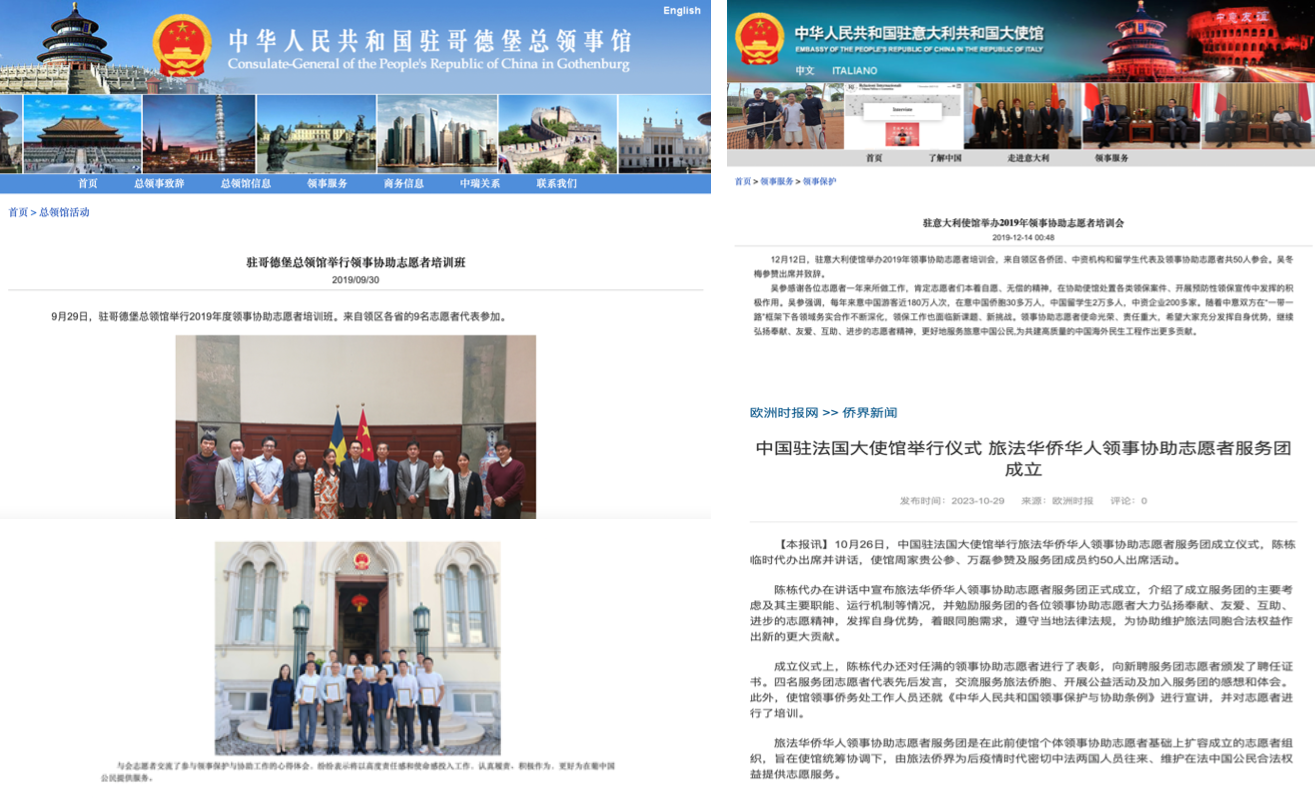
Notices on appointments, trainings and commendation ceremonies throughout the years appear on embassy or consulate websites, such as in Sweden (f.ex. 2019 and 2020), Italy (f.ex. 2018, 2019 and 2023), Spain (f.ex. 2021), Greece (2022), Portugal (f.ex. 2023) or France (f.ex. 2019 and 2023). The PRC embassy in Prague, Czech Republic, even published a call for applications (pending approval by the embassy), specifying “recruitment targets”: Overseas Chinese, international students, Chinese employees of Chinese-funded enterprises and other individuals in the Czech Republic, overseas Chinese groups, Chinese-funded enterprises and other organizations, institutions and groups.
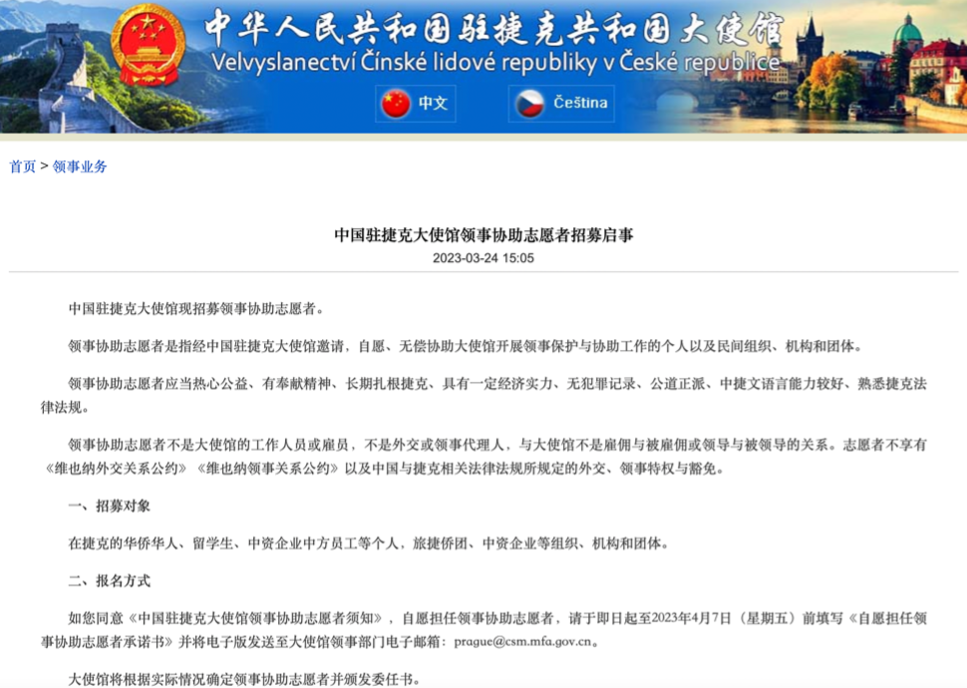
The network is obviously not constrained to Europe. Similar notices pop up all over the globe, as examples from Trinidad and Tobago, Botswana, Turkey, Malaysia, Johannesburg, Equatorial Guinea, Chile, Japan, or a most recent event - in cooperation with local authorities - in Mongolia show.
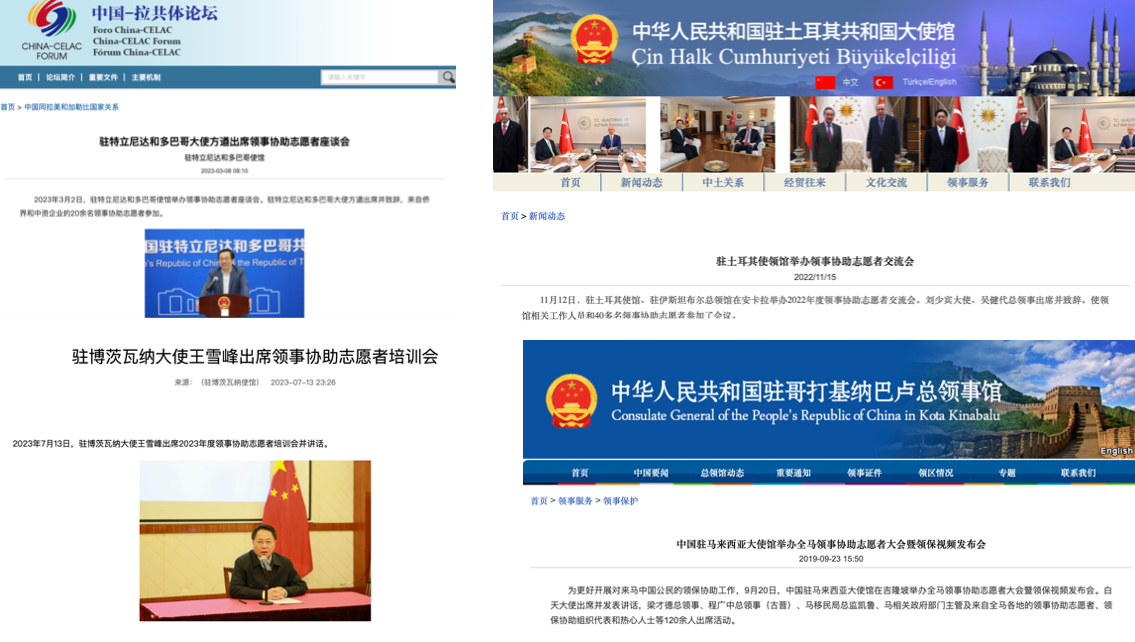
Nor has the pre-July 2023 Decree effort been carried out solely by embassies and consulates overseas. Often referencing the 14th Five-Year Plan and Xi Jinping’s overarching foreign policy strategy, local foreign affairs offices across China contributed to the establishment of overseas consular protection service points as well. Such is the case for Jinhua, Wenzhou, Lishui, Wencheng, and Shaoxing, all in Zhejiang Province, which boasts a large overseas diaspora.
If some of those cities ring a familiar bell, that should not come as a surprise. While we wish to emphasize that these consular liaisons are not the same as the so-called “overseas police service centers” in terms of their instituting authority [for the purposes of its previous reporting on the matter, Safeguard Defenders narrowly defined the “overseas police service centers” as those established by a public security authority in China], the networks of associations and individuals on which these platforms are run are indeed the same and frequently overlap.
Once again, the individuals named during consular volunteer commendation ceremonies or training events have direct and demonstrable ties to the CCP’s United Front.
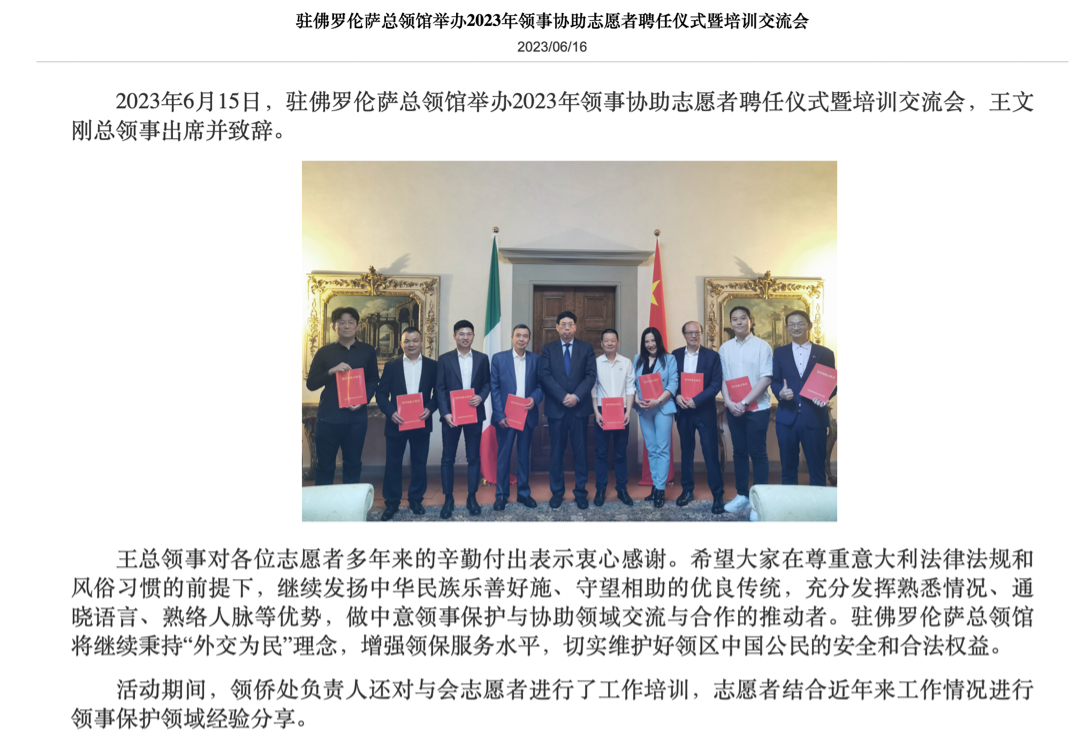
The United Front linkage runs deeper than the individual volunteers involved. As an example, the Overseas Chinese Affairs Office pops up in a 2021 Consulate General symposium for consular volunteers in Rio de Janeiro. Similarly, a training activity held during a 2023 Consular Assistance Volunteer Appointment Ceremony and Training Exchange Meeting at the Consulate General in Florence, Italy, was reportedly conducted by the same Overseas Chinese Affairs Office (OCAO), an external name used for the CCP’s United Front Work Department.
The Australian Strategic Policy Institute (ASPI) describes the latter as “a complex and opaque set of organisations designed to advance the CCP’s influence in industry and civil society. Within China, the united front system has several responsibilities, which range from repressing ethnic minorities in Tibet and Xinjiang to grooming members of China’s minor political parties to take up positions in government. But in addition to its extensive activities inside the country, the united front system acts as a liaison and amplifier for many other official and unofficial Chinese organisations engaged in shaping international public opinion of China, monitoring and reporting on the activities of the Chinese diaspora, and serving as access points for foreign technology transfer.”
The 2022-2023 report from the French Parliamentary delegation on intelligence states: “The Middle Kingdom has entered a new phase, where interference strategy occupies a central place, around the concept of “United Front”. This policy designed and deployed by the Chinese Communist Party (CCP) consists of hindering its internal and external enemies, controlling groups that can challenge its authority, building a coalition around the Party to serve its interests and projecting its influence abroad. […] To carry out its power strategy, China uses different levers of action [among which] the use of diasporas which represent 40 to 60 million people in the world, including 600,000 in France. The strength of the Chinese intelligence and interference system abroad relies on the support provided by this diaspora, particularly in the fight against the ‘five poisons’ which are considered threats to the stability of the CCP’s power: democrats, Falun Gong, Taiwan, Tibet and Xinjiang. […]”
In fact, these ‘threats’ are never far away. In a December 2019 consular volunteer meeting by the Strasbourg Consulate General relates Consul General Ling Jun’s “introduction of the spirit of the Fourth Plenary Session of the 19th Central Committee of the Communist Party of China, and expression of his views on the recent situation in Hong Kong, the passage of Xinjiang-related laws by the United States and other issues, and conveyed China's solemn position”.
At an August 2022 symposium by the Consulate General in Manchester, during which consular assistance volunteer certificates were issued, then-Consul General Zheng “stressed that the white paper ‘Taiwan Issues and the Cause of China's Reunification in the New Era’ published by the Chinese government once again solemnly demonstrated the strong determination of the Chinese government and the Chinese people to unswervingly promote the complete reunification of the motherland. The criminal attempt of ‘Taiwan independence’ elements to split the motherland and the sinister use of anti-China forces in the United States and the West to hinder China's unification will surely is bound to fail. It is hoped that the overseas Chinese community in the territory will continue to unite, hold the banner of anti-independence high and make new contributions to the cause of reunification of the motherland and the great rejuvenation of the Chinese nation in the new era.”
The United Kingdom’s House of Commons Intelligence and Security Committee of Parliament 2023 China report notes: “The Chinese authorities take a strong interest in the political views and activities of the Chinese diaspora overseas. […] Notwithstanding the size of the Chinese population, the JIC Chair told us: ‘China will be seeking in some cases no doubt to coerce [the Chinese diaspora in the UK], but certainly to encourage [it] to follow a line which is consistent with China’s interests.’”
Most apt in the current context is the summary provided by the German Marshall Fund’s Alliance for Securing Democracy (ASD) of a January 2022 Federal Canadian court decision that “upheld a decision identifying the Overseas Chinese Affairs Office (OCAO), an administration that is part of the CCP’s United Front Work Department (UFWD), as an entity that engages in espionage and acts “contrary to Canada’s interests.” The ruling upheld a Canadian official’s denial of permanent Canadian residence to a Chinese citizen owing to their more than 20-year employment with the OCAO. Officially, the OCAO manages overseas issues related to China, including liaising with the Chinese diaspora. However, in court, Canadian Immigration argued “that the nature of OCAO’s interactions with the overseas Chinese communities, the information gathered, and the intended use of the gathered information is surreptitious,” — an assertation the judge upheld. UFWD is the CCP agency responsible for ensuring Party control of PRC society, including Chinese businesspeople and members of the Chinese diaspora, and has been linked to cases of political interference around the world.”
Ostensibly, the tasks carried out by the consular volunteers – in close cooperation with and under the guidance of local PRC embassies and consulates – are of an administrative nature, such as handling and assisting in consular protection incidents; relaying information such as risk assessments, warnings and advisories to overseas citizens and organizations; or assistance in document renewal [despite the adoption of an electronic CONSUL APP during the pandemic].
Considering the cited note by Canadian Immigration authorities on the concerns over “OCAO’s interactions with the overseas Chinese communities, the information gathered, and the intended use of the gathered information”, one can begin to see why these consular volunteer liaisons may be far more problematic than the prima facie breach of the Vienna Convention on Consular Relations.
To an outside observer, the availability of a close-to-home consular liaison volunteer to assist in what are mundane activities in a democratic society – such as passport or other document renewals – may seem benign or even most convenient. More so even in circumstances where individuals are – rightfully – fearful of visiting official consular outposts as the PRC ramps up its transnational repression efforts.
However, the consolidation of overseas United Front networks as the legitimate providers of consular community assistance not only gives them potential broad access to individuals’ private data, home address and contact information, but may also dangerously enhance their function of control over overseas communities and dissenters. The fact that these functions are carried out under the guidance of local consulates and embassies does not diminish such risks, especially when considering how a series of reports by diaspora communities have pointed towards the PRC’s weaponization of such seemingly mundane services.
Unlike in a democratic society, in the PRC the issuance of passports and other documents such as entry visas are heavily politicized and frequently used as an instrument of control and leverage over residents overseas, for instance to ensure they conform to Party diktats, comply with requests to act as informants within the community, or coerce them into returning to China.
The recently adopted Resolution 2509 (2023) by the Parliamentary Assembly of the Council of Europe in fact notes among the four main methods of transnational repression: “Mobility impediments such as passport cancellation and denial of consular services, preventing the target from travelling or causing them to be detained.”
Moreover, references to an “increasingly complex overseas security situation of both traditional and non-traditional nature” are often around the corner. During the third Consular Assistance Volunteer Symposium held at the PRC Embassy in Italy in 2022, Minister Counselor Guo stated she hoped “all volunteers will continue to stay true to their original aspirations, have the motherland in mind, care for their compatriots, and make greater contributions to deepening Sino-Italian exchanges, build an overseas ‘Great Wall of Consular Protection’, and build an overseas Chinese security system.”
A similar security-minded approach is echoed during a briefing on the policy of consular protection and assistance by the State Council Information Office of July 14, 2023: “we are promoting the institutional construction of consular protection and assistance, and continuously upgrading the capacity of consular protection work. We are also improving the consular protection system, which involves interactions among the central government, local authorities, embassies and consulates, enterprises and individuals, and continuing to promote the construction of a mechanism to gradually build up a protection network for overseas security.”
If China hadn’t adopted the Decree so soon after the Hiroshima G7 communique, this piece might not have been published.
First of all because there is a real risk of mistaking trees for the forest. We believe these are but iterations of what is inherently the nature of the beast: the CCP’s continued quest for establishing long-arm control over its diaspora communities.
Secondly, right or wrong as a practice may be, our prime concern is and must always be with the targeted diaspora communities and the potential unintended harm reporting may create.
Nobody should seek to excuse United Front activity or diminish its nefarious impact. But neither should we fail to acknowledge the impact of sensationalised reporting, which may have contributed to what some Party-state outlets have called ‘demonisation of overseas Chinese’. The wide nets of suspicion cast over the entire community may be harmful and risk further isolating community members overseas from their democratic hosts.
However, we would also posit that this feature is a direct – and possibly intended – consequence of the Party-state’s behavior and policies. It is abundantly clear that its so-called people-centered approach does not care about the harm its activities may bring to overseas communities or even the legal ramifications and potential criminal liabilities it may expose its undeclared proxies in third countries to, as long as it serves the Party interest and hold on power.
This is particularly painful in the context of the enhanced cooption of some long-standing community aid groups by the United Front over the past decade(s). Unfortunately, the Party-state linkage that was reinforced under Xi Jinping [in quoting from Hidden Hand: Exposing How the Chinese Communist Party is Reshaping the World (2020) by Mareike Ohlberg and Clive Hamilton: “At the 19th Party Congress in 2017, Xi famously used a quotation from Mao to explain the role of the Party in China: ‘Government, military, society and schools, north, south, east and west – the party rules everything’.”] and that cannot conceive of independent civil society leaves little room to those that genuinely set out to help their fellow diaspora compatriots but to comply with Party edicts.
For this reason, we will not publish any lists of those that are statedly involved in the consular volunteer practice but rather renew our recommendation to lawful authorities to examine the practice and those that may be involved in this and other activities on behalf or at the behest of the Party-state. We further continue to recommend all officials and stakeholders in democratic societies to refrain from legitimizing such associations and individuals by partaking in their activities.
As we have previously stressed, the dual role played by these networks in influence activities within their local environments on the one hand, and the exertion of control against dissent within overseas communities on the other, appears as a key feature of these set-ups. The former role of often-time long-term engagement with local officials and opinion-makers in third countries directly contributes to the legitimization of individuals and organizations, which in turn fuels distrust towards those same officials and opinion-makers in those that may fall victim to the United Front’s or other CCP agency’s repressive activities.
This short investigation did not intend to provide an in-depth overview of the PRC’s consular volunteer networks, but rather to continue questioning the Party-state’s behavior of putting itself above the law not only in but also outside China.
To our knowledge, none of these liaisons have been declared to host country authorities by the PRC or other relevant actors, let alone received consent. The fact that these consular liaisons are unpaid volunteers that do not enjoy any of the diplomatic immunities or benefits that would be guaranteed under the Vienna Convention should not exempt them from abiding by the legal international framework set out by that same Convention.
Beijing’s flaunting of international laws and national sovereignty is far from new. Neither are its attempts to dissuade legitimate criticism by writing unlawful practices into domestic law.
Now we know not all countries may see eye to eye on this, even within that same G7 that called upon the PRC to respect the Vienna Conventions. But we would plead with them to see the broader picture of these singular infractions and look at the intersections with topics of increased interest such as foreign interference, malign influence and disinformation, and, last but definitely not least, transnational repression.
Recent experience teaches that for every little infringement of the international rules-based order to which we close our eyes, not only does a multitude follow. It also lends further legitimacy to these parallel structures “with Chinese characteristics”.